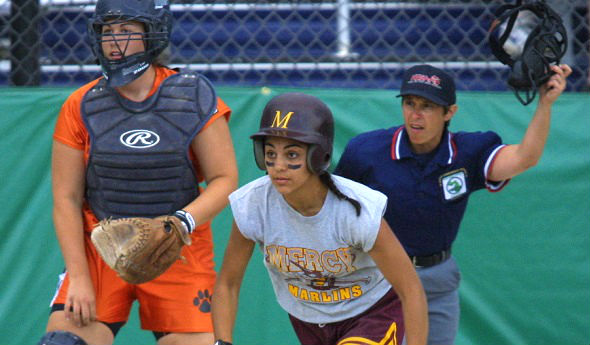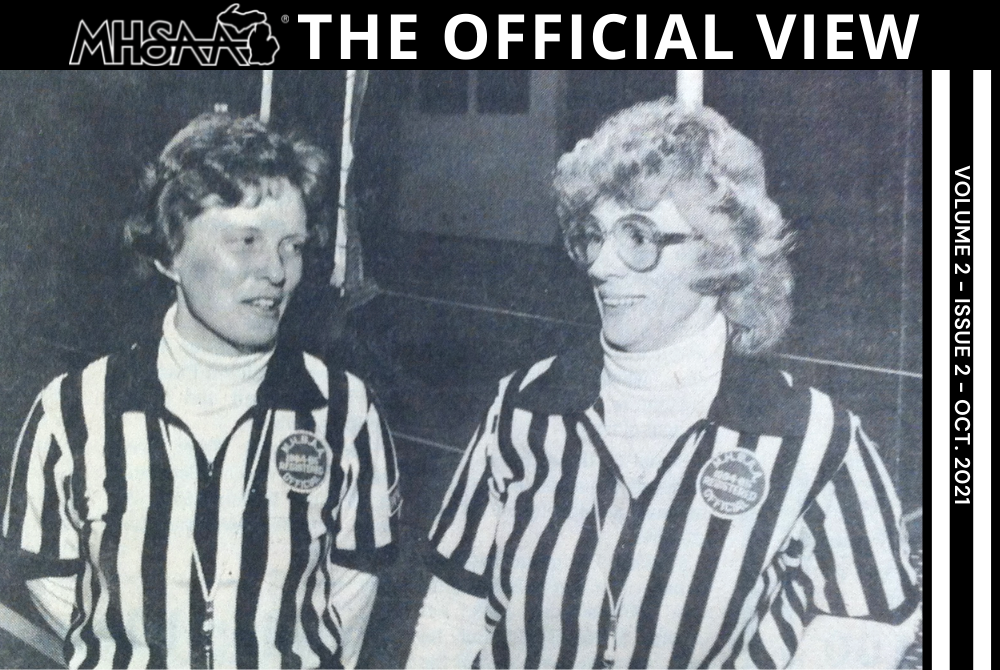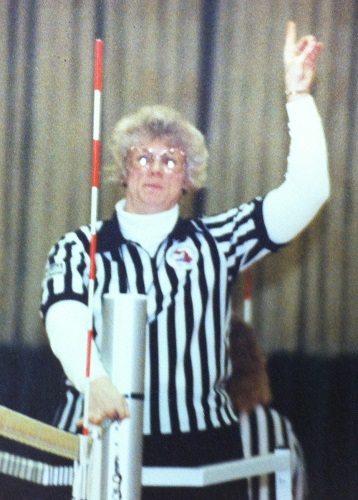
Norris Winner Hoover Elite on All Levels
April 15, 2016
By Geoff Kimmerly
Second Half editor
Linda Hoover always had aspired to become a coach, and her class schedule at Olivet College during the late 1970s reflected that goal.
But at the suggestion of one of her advisors, Hoover added an officiating class one term. That same advisor soon needed a partner to officiate a volleyball match a few blocks down the road at Olivet High School – and Hoover found herself registering with the MHSAA the day before the first serve.
“I was scared as heck,” Hoover recalled this week. “I was going up the ladder for the varsity match, and I said, ‘It’s my first one!’ But she was kind enough … and I knew what I was doing. I was comfortable, and I truly enjoyed it.”
Nearly four decades later, Hoover has officiated eight MHSAA Volleyball Finals and seven Softball Finals – in addition to serving as an umpire at four NCAA Division I College World Series, nine Amateur Softball Association Nationals and four softball World Cups. She also has officiated at the Olympic Trials and China’s Republican National Games, and is scheduled to work the USA Junior Olympic Cup this summer in Georgia.
Admired as a pioneer in officiating, especially by women who have followed in taking up the avocation, she also continues to serve Michigan at the high school level as an umpire, clinician and mentor, and has been selected to receive the Michigan High School Athletic Association’s Vern L. Norris Award for 2016.
The Norris Award is presented annually to a veteran official who has been active in a local officials association, has mentored other officials, and has been involved in officials’ education. It is named for Vern L. Norris, who served as executive director of the MHSAA from 1978-86 and was well-respected by officials on the state and national levels.
Hoover will be honored at the Officials’ Awards & Alumni Banquet on April 30 at the Crowne Plaza Lansing West in Lansing. She is in her 36th year as an MHSAA-registered official, working softball and volleyball in addition to softball at the collegiate, national and international levels.
A teacher at Marshall from fall 1982 until her retirement at the end of the 2013-14 school year, Hoover also has served as a clinician for numerous softball and volleyball officiating clinics and as a clinician and officials evaluator during the MHSAA Softball Finals. She has contributed on various MHSAA committees and assisted at the MHSAA Volleyball Finals, and also served as a facilitator and speaker at the MHSAA’s Women in Sports Leadership Conference.
“I’ll never forget when I was still a rookie official, I’d been in it four or five years, and I was going to a high school softball game. A couple of girls were like, ‘Oh my gosh, we have a female official,’” Hoover said. “They’d never seen a female umpire.
 “I want to present a positive role model, a positive experience for those who might want to get into (officiating).
“I want to present a positive role model, a positive experience for those who might want to get into (officiating).
Hoover graduated from Constantine High School in 1977 and Olivet College in 1981 with a bachelor’s degree in physical education and minors in communications and psychology. She lettered in field hockey, basketball, softball and volleyball during her college athletic career, and is a sports Hall of Fame member for both her high school and college.
Hoover went on to earn her master’s degree in athletic administration and an endorsement in health education, both from Western Michigan University. At Marshall, she taught primarily freshman health education and also classes in physical education and child psychology.
She also did get that opportunity to coach, first middle school volleyball at the former Wattles Park (now Battle Creek Harper Creek), then junior varsity softball and middle school basketball at Marshall. But she found she enjoyed officiating more than coaching – and also found the avocation to be her “niche” and a place where she could make an impression on female athletes in particular.
“Linda Hoover is considered by her peers as one of the elite softball umpires in this country, and she continues to share her gifts with athletes and coaches at our level while serving as an inspiration for many aspiring officials,” MHSAA Executive Director John E. Jack Roberts said. “She has provided decades of leadership and commitment to her craft. And as during her many years of classroom teaching, Linda is a tireless, understanding and energetic instructor as she works with officials seeking to reach toward her high level of expertise.”
Hoover also has been inducted into the Michigan Amateur Softball Association Hall of Fame and has received recognition as an “Elite Umpire” by ASA/USA, and attained the gold level of the ASA Umpire Medals Program. She was awarded membership in the ASA’s National Indicator Fraternity and certification by the International Softball Federation.
About half of the games she currently officiates are at the high school level; she also continues to officiate in the Mid-American Conference and has worked in the Big Ten, Big East and Missouri Valley conferences among others as well.
Hoover also contributes to her community as a volunteer for Marshall Area Community Services – she is a past board member for the program – and volunteers as well for the Marshall Fountain Clinic.
Past recipients of the Norris Award
1992 – Ted Wilson, East Detroit
1993 – Fred Briggs, Burton
1994 – Joe Brodie, Flat Rock
1995 – Jim Massar, Flint
1996 – Jim Lamoreaux, St. Ignace
1997 – Ken Myllyla, Escanaba
1998 – Blake Hagman, Kalamazoo
1999 – Richard Kalahar, Jackson
2000 – Barb Beckett, Traverse City; Karl Newingham, Bay City
2001 – Herb Lipschultz, Kalamazoo
2002 – Robert Scholie, Hancock
2003 – Ron Nagy, Hazel Park
2004 – Carl Van Heck, Grand Rapids
2005 – Bruce Moss, Alma
2006 – Jeanne Skinner, Grand Rapids
2007 – Terry Wakeley, Grayling
2008 – Will Lynch, Honor
2009 – James Danhoff, Richland
2010 – John Juday, Sr., Petoskey
2011 – Robert Williams, Redford
2012 – Lyle Berry, Rockford
2013 – Tom Minter, Okemos
2014 – Hugh R. Jewell, West Bloomfield
2015 – Sam Davis, Lansing
High school game officials with 20, 30, 40, 45 and 50 years of service also will be honored at the Officials’ Awards & Alumni Banquet on April 30.
Six officials with 50 or more years of service will be honored, along with 34 officials with 45 years. A 40-year award will be presented to 68 officials. In addition, 108 officials with 30 years and 193 officials with 20 years of experience will be honored. With the induction of this year’s group of 409, the honor roll of officials who have aided young student-athletes grows to 10,197 since the inception of the banquet in 1980.
Tickets for the banquet are available to the public and priced at $20. They will not be sold at the door. Tickets can be ordered by calling the MHSAA office at (517) 332-5046 or by sending the order form. Click for a full list of officials who will be honored.
PHOTOS: (Top) Linda Hoover watches a play unfold during an MHSAA Softball Final. (Middle) Hoover works one of her eight MHSAA Volleyball Finals.
VIDEO: Linda Hoover was one of many officials who answered the question "Why Do You Officiate?" for this MHSAA series.

The Official View: Title IX – Door Opens for Female Officials
By
Brent Rice
MHSAA Assistant Director
October 29, 2021
In the 50 years since Congress passed Title IX legislation in order to create equal educational opportunities, huge strides have been made for female students to participate in athletics.
But the advancement of opportunities wasn’t just for the athletes. It also opened a door which ushered in a generation of female sports officials.
Betty Near is one of those officials whose long and distinguished career as a high school and collegiate volleyball official is a direct result of the opportunities provided through Title IX. Unlike many today who entered officiating after having played the sport, Betty didn’t have those opportunities before first climbing the ladder (literally) in 1971. She was encouraged to take up the sport by Macia Tiesenga (a nationally-ranked collegiate official) who told Betty – who had been involved in athletics recreationally – that athletes make the best officials because of their understanding of competition.
“I’m frequently asked whether I got into officiating because I played volleyball. I tell them I didn’t play because girls volleyball didn’t exist when I was in school," Near said. "I try to share the story of Title IX every chance I get, to show them that they now have opportunities to both play and officiate because of those that came before them.”
Near has spent more than 45 years as a registered MHSAA official and is still going strong. That run has included six appearances as a Finals official. She recalls how at one of those Finals, an injury to her knee created a change in mechanics for the entire state.
“When I first began officiating in the 70s, the MHSAA had the umpires (R2s today) kneel underneath the net to look at blockers," she said. "This was quite dangerous and pretty ineffective.
"Officiating at the collegiate level, I had been trained to stand at the pole and look down the net. With this background, and seeing as my knee was still hurting from an earlier injury, I decided to use this mechanic.”
 Sue Martin, the MHSAA director for volleyball at the time, approached Betty following her match. Near was certain that she was going to receive an earful. Instead, Martin asked the justification for using the mechanic, and they discussed the pros and cons of each. It was ultimately decided moving forward the umpire would take a position standing at the pole.
Sue Martin, the MHSAA director for volleyball at the time, approached Betty following her match. Near was certain that she was going to receive an earful. Instead, Martin asked the justification for using the mechanic, and they discussed the pros and cons of each. It was ultimately decided moving forward the umpire would take a position standing at the pole.
Mechanics changes aren’t the only effect Near has had on the sport. She was instrumental in the start of the West Michigan Volleyball Officials Association in 1984 and continues to help lead and grow that organization (now with more than 125 members). This has allowed her to work with the community, raising nearly $125,000 for scholarships for graduating high school seniors. And one of her biggest contributions remains her role in recruiting and mentoring new officials – especially helping to develop the next generation of female officials.
“Mentoring is a gratifying thing,” said Near, “especially when I receive emails or calls thanking me for helping them understand specific rules or situations and improving their skill sets. Watching someone I have mentored over 20 years work her way up to officiate multiple state tournaments (pleases me).”
Now officiating primarily at the college level, Betty still reserves Thursdays during the season to officiate MHSAA contests. She does this for the purpose of staying connected to high school students and officials and to build on the growth of female registered officials, though she also recognizes that challenges remain for female officials advancing through the system.
One of the natural barriers that apply to women more often than men is that women who begin families sometimes find difficulties continuing to officiate with their other responsibilities. While home lives can be difficult to navigate (for both women and men), officiating school sports provides a flexible alternative to stay active, remain involved in athletics, give back to the community, develop camaraderie and earn some extra cash.
Another hurdle that Near identifies for female officials, unfortunately, is a continuation of the “good ol' boy network.” She is reminded of a not-so-distant-past example when she and another female official had been selected to officiate the Regional round of the MHSAA Tournament; and even though both were well-established collegiate officials the host athletic director insisted that less-experienced male officials work as the R1 and R2 and the women work as line judges because the men would have better control of the tough matchup.
Of course, that kind of mindset isn’t based in fact, and many of the MHSAA’s best officials in all sports are women. Especially in girls sports, it is important that the student athletes see officials who represent them; but the MHSAA seeks female officials in all sports, including those dominated by male participants. This year will once again include a female officiating in the MHSAA Football Finals. Female officials also have worked Finals in baseball, boys basketball, ice hockey and wrestling.
The door that was opened for women and girls with the passing of Title IX a half-century ago only provides the opportunity. Capitalizing still requires stepping through the door to take full advantage of the opportunities provided. Near wants to encourage anyone to join the avocation of officiating, but especially young women.
“My hook is that the officiating is fun, and it is an activity that can be an avocation that can pay (in many ways) throughout their lifetimes," she said.
It’s Official!
Postseason Assignments: Officials assignments for fall sports tournaments have been released. Congratulations to all selected to officiate this year.
Speaking of tournament assignments, a change will be made this year that allows basketball officials to submit their availability to work together as a crew. Crews can be set for the boys and girls tournaments separately. The hope is that this will encourage more officials to seek postseason consideration, knowing they can choose with whom they will officiate. Eligible individuals not included with a crew will be assigned a crew by MHSAA staff.
For all winter sports officials, make sure to complete all requirements for postseason consideration. Please remember that officials in basketball, competitive cheer, gymnastics, ice hockey and wrestling must opt-in to the tournament by indicating their tournament availability dates HERE. All additional requirements such as completion of tournament exams and submission of regular-season schedule also remain in place.
Officials Review Committee: The Officials Review Committee, consisting of school administrators, officials and assigners from around the state, convened in early October to discuss issues and concerns involving officiating. A number of proposals were made to the MHSAA Representative Council. You can find these and other discussion items by reviewing the minutes HERE.
Know Your Rules
SOCCER A player (#7) is injured and must leave the field. His team elects to play short-handed. If #7 heals up, when can he return to the field? What if they wish to replace him with #12?
RULING If #7 comes back into the game, he only needs to wait until the next stoppage of play. If he will be replaced by #12 though, #12 can enter the game only at the next legal substitution opportunity.
It’s Your Call
REVIEW Last month’s play involved a suspect block by a defensive player (found here). The block by B17 is correctly flagged for an illegal block below the waist. While not widely known by spectators, blocks below the waist (except for linemen immediately at the snap) are illegal for players on both sides of the ball. In this case, since the block was by the defense, the penalty is enforced 15 yards from the end of the run.
VOLLEYBALL Officiating ball handling is the topic of this month’s "It’s Your Call." This rally ends following the pass of a back-row player. What’s the call?

